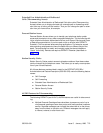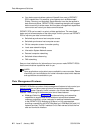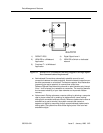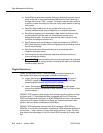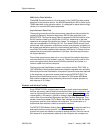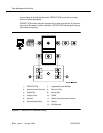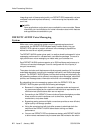
Digital Interfaces
Issue 5 January 1998
8-7555-230-024
Data Modules
Data modules connect DEFINITY ECS with other communications equipment,
changing protocol, connections, and timing as necessary.
DEFINITY ECS supports the following types of data module:
■ High Speed Links
■ Data stands
■ Modular-processor data module
■ 7000-series data modules
■ Modular-trunk data module
■ Asynchronous data unit
■ Asynchronous data module (for ISDN-Basic Rate Interface telephones)
■ Terminal adapters
All of these data modules support industry standards and include options for set-
ting the operating profile to match that of the data equipment. The data modules
that are currently available with DEFINITY ECS are described below.
High Speed Links
The DEFINITY High Speed Link, a DCP-based data module, lets you transmit
data through your DEFINITY Communications System at faster speeds, allowing
you to take advantage of emerging technologies such as videoconferencing and
Local Area Network bridging.
More and more companies are realizing that technologies and applications, such
as Local Area Network-to-Local Area Network communication, videoconferenc-
ing, file transfer, and Group 4 fax transmissions are necessary to compete effec-
tively in a global market. The DEFINITY High Speed Link offers you a
cost-effective way to manage these applications.
Used when integrated voice and data is not required, the High Speed Link has
an internally timed V.35 interface for synchronous data transmissions at 56 kbps
(half and full duplex) and 64 kbps (full duplex) in both switched and permanent
connections.
It offers access to low-cost, dial-up communications and provides a link to
high-speed network services such as the ACCUNET Switched Digital Services
and Software Defined Data Network Services. When accessing these network
services, the High Speed Link can communicate with applications terminating on
either a digital service unit or another High Speed Link.
Its numerous testing features make system fault isolation easy. For example, the
High Speed Link offers a variety of client-or network-initiated loop-back tests that
increase reliability, such as the capability to isolate problems remotely.



